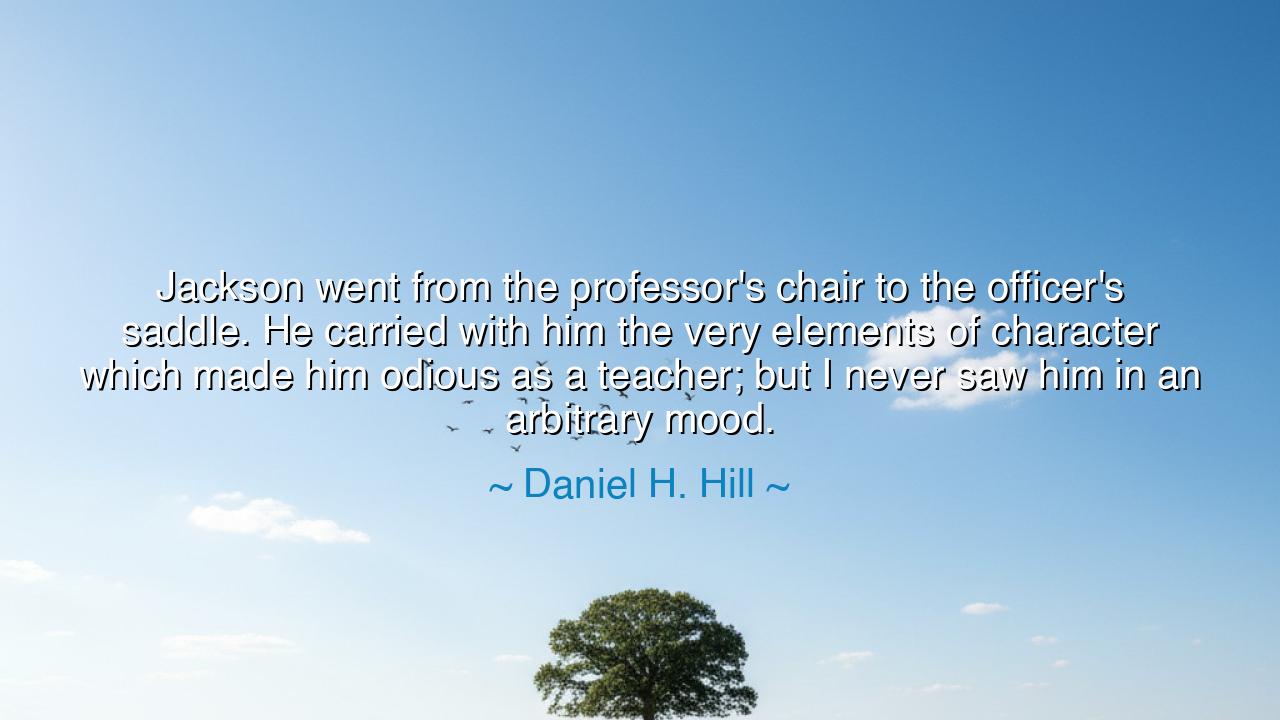
Jackson went from the professor's chair to the officer's saddle.
Jackson went from the professor's chair to the officer's saddle. He carried with him the very elements of character which made him odious as a teacher; but I never saw him in an arbitrary mood.






The words of Daniel H. Hill—“Jackson went from the professor's chair to the officer's saddle. He carried with him the very elements of character which made him odious as a teacher; but I never saw him in an arbitrary mood”—speak to the complex nature of leadership and character. Here, the transition from teaching to command is framed not as a simple shift in occupation, but as a journey in which the qualities of one role influence the other. The man described—Andrew Jackson—is depicted as carrying traits that once provoked irritation or resistance in the classroom, yet these same traits in the realm of military command were tempered by restraint, fairness, and deliberation.
The meaning of this reflection lies in the interplay between personal temperament and situational authority. Traits that may irritate or even offend in one context, such as impatience, rigor, or bluntness, can manifest as strength, decisiveness, and clarity in another. Hill observes that although Jackson possessed qualities that made him “odious” as a teacher, he never became arbitrary in command, demonstrating that power is not merely the expression of personality, but the careful calibration of judgment and justice.
History is replete with figures whose strengths and weaknesses were revealed differently depending on circumstance. Consider George Washington, who was often rigid and formal in his civilian life yet became a unifying and disciplined commander during the Revolutionary War. His ability to restrain personal impulses while exercising authority mirrors Hill’s observation about Jackson: character traits themselves are not inherently virtuous or vicious, but their expression within context determines their moral and practical value.
The duality of personality and role can also be seen in Leonardo da Vinci, whose relentless curiosity and exacting standards made him a difficult teacher and collaborator, yet allowed him to excel in fields of invention, anatomy, and art. Like Jackson, traits that irritate in one sphere may confer unmatched capability in another. Hill’s insight encourages reflection on how context transforms character, and how restraint and awareness can prevent negative traits from undermining authority.
The lesson for us, O seekers of wisdom, is that self-awareness and discipline are the keys to effective leadership and influence. We must recognize that traits which may appear burdensome in one setting can serve the greater good in another, provided they are guided by principled judgment. To wield authority without arbitrariness is to temper natural tendencies with reflection, ensuring that power serves others rather than gratifies the self.
Practically, this means cultivating self-knowledge and mindfulness. Observe how your temperament manifests in different roles—whether teaching, leading, or collaborating. Develop the capacity to temper impatience, bluntness, or rigidity with fairness and consideration. Recognize that effectiveness is not merely about traits themselves, but about the conscious manner in which they are applied. Character, like a sword, must be wielded with skill and purpose.
Thus let it be inscribed upon the scrolls of memory: traits are neither inherently good nor bad, but context transforms them into strength or weakness. Daniel H. Hill’s observation of Jackson teaches that leadership requires both authenticity and discipline, that authority is a measure of restraint as much as it is of action. By cultivating awareness of one’s character and adapting its expression to the demands of circumstance, one may lead without arbitrariness and act without injustice.






AAdministratorAdministrator
Welcome, honored guests. Please leave a comment, we will respond soon